Kevin Gallagher is in good company when he says, “We should measure the level of civilization not just by its economic indicators, but by how it treats its most vulnerable members.”
With slight variations, Samuel Johnson said it, as did Winston Churchill and Jimmy Carter. Mahatma Ghandi may have done. But when it comes down to it, there’s a long way to go.
“If we were honest, considering the amount of money and tech at our disposal, we do a pretty poor job of providing tools to the disabled, so they can enjoy the lives we do,” says Gallagher, who has for the past three years been providing assistive technology services to the severely disabled, as part of the four-member Icebreaker Project (破冰協會). Headquartered in Taipei, it is a registered, national organization.
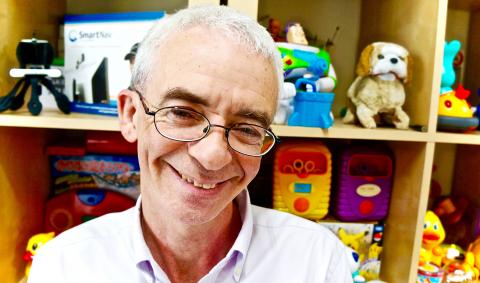
Photo: Jules Quartly
“The people who need tech the most in life are the disabled. Yet they are the ones who have the least access to it. If I don’t have a smartphone, I’ve still got a life — maybe an even better one — but it can be a disabled person’s only means of communication,” Gallagher says.
“Also, just because someone doesn’t speak, it doesn’t mean that they don’t have anything to say. You only have to think of [theoretical physicist] Stephen Hawking. If he didn’t have access to technology, he would probably be lying in a bed in some care home looking at the TV or ceiling. There could be a lot more Hawkings out there,” he says.
“Everyone has an ability, no matter how severe the disability. If the individual cannot talk or walk, it’s the job of a professional to find the ability and if you can’t find it, then you should try even harder, because it’s there.”
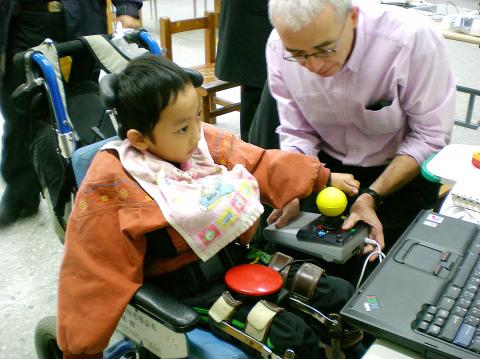
Photo courtesy of Icebreaker Project
An example, perhaps, of how far we have come and how far we have to go was when I asked Gallagher and the other three members of the Icebreaker team about definitions of disability. The reason being, my 8-year-old kid had a classmate who was severely disabled and everyone referred to him as a vegetable (植物人). I’ve never been accused of being politically correct, but this did jar.
Obviously, there are words and minds to change on this issue, which is where Icebreaker’s educational seminars for therapists, teachers, parents and business leaders make a difference. The aim here, put simply, is to show that with assistive technology: “No Ability/Changes/To Ability” — which actually works better in Chinese (不能, 變成, 有能).
For someone like Gallagher, an engineer from the mean streets of Scotland’s Glasgow, the shame is that all the money and ingenuity used to create augmented soldiers, US$1 billion rail guns and drones, in order to kill or maim, are not harnessed instead to improve lives.
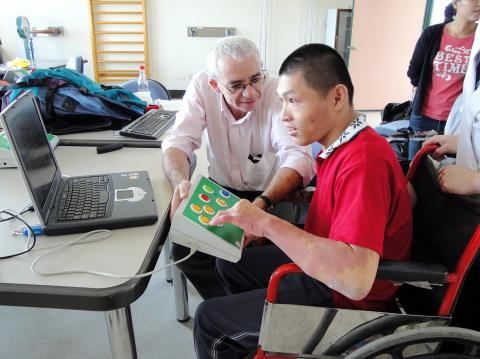
Photo courtesy of Icebreaker Project
The story of how he ended up living in Hsinchu City working with the severely disabled and doing his bit for those on the margins of society is an inspiring one. A sensitive kid in a tough environment, he had a stutter that occasionally re-emerges when we talk.
His dad was originally from Ireland and after working as a laborer borrowed enough money to buy a pub. But while his classmates were into soccer rivalries and typical teen stuff, the young Gallagher did well in science, physics and technical subjects.
He went to University of Strathclyde and got a degree in electronic engineering, migrated to Holland and worked for Phillips, then Honeywell, before getting his dream job at IBM. In the prime of life, he was a mid-level manager with a home in leafy Hampshire, five motorbikes, a Mercedes and regular cruise holidays.
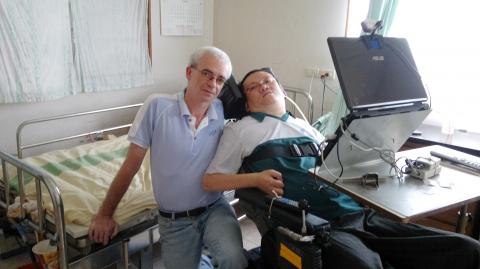
Photo courtesy of Icebreaker Project
“I thought I had made it, but there was a little voice in my head. There was a lack of meaning, and materialism wasn’t going to solve the problem,” Gallagher says.
He can even remember the “aha!” moment of illumination. A work colleague was complaining about a faulty warning light on his car and Gallagher thought to himself: “My God, is this it? There’s got to be a better way. This is all going to end in tears.”
So when the call came to help others, he was ready. He reached out to a friend, a Jesuit priest who was learning Chinese in Taiwan, and in 1990, ended up working as a volunteer with children who had learning disabilities.
Two years later, he met Denise Lai (賴美智), director of the First Social Welfare Foundation (FSWF, 一社會福利基金會), who had the idea of starting a center for assistive technology, ranging from wheelchairs and walkers, to switches and communication aids. After working at FSWF, Gallagher and two colleagues eventually started their own assistive technology organization, the Icebreaker Project.
“My two-year plan turned into six. My father probably thought this was where the rot set in. It was in about 1993 and there was less awareness of disabled issues at that time. Social integration and even the right to education were issues,” he says.
“Christian organizations showed the way then to some extent, after which the charitable sector grew, followed by the government and improved social services. Now, we have an integrated education approach. We have seen big progress. You can always do more. It never stops. No country will ever have perfect social services.”
Being brave enough to follow the voice in his head and ignore the expectations of others, find himself at home in paddy fields rather than near dockyards, getting married to a local … It’s not what Gallagher or his parents imagined, but there it is, he found meaning by improving the lives of others in some far off land.
“So many people have an entitled attitude to life,” Gallagher says. “In business classes we were taught to think, ‘I’ve earned it because I deserve it.’ But actually, this is a fallacy. Who gave you your education? Who looks after you when you are sick? Who made that car you are so in love with? Who makes that meal in the fancy restaurant you go to? Did you really do it all by yourself?”
Gallagher’s message is that we need each other, and while the disabled may need more, by giving them the opportunity we not only help them but help ourselves, and raise the level of society.
“Being in touch with people on the margins of society exposes our own vulnerabilities. This is the value of vulnerability.”
Can refer to Taipei 101; an introductory course or analysis; One uh One, a spare male at a party, or a useless person — always male; there are about 1.01 men for every 1 woman, thus, every one hundred and first male is not going to find a partner-; a one-on-one interview

With one week left until election day, the drama is high in the race for the Chinese Nationalist Party (KMT) chair. The race is still potentially wide open between the three frontrunners. The most accurate poll is done by Apollo Survey & Research Co (艾普羅民調公司), which was conducted a week and a half ago with two-thirds of the respondents party members, who are the only ones eligible to vote. For details on the candidates, check the Oct. 4 edition of this column, “A look at the KMT chair candidates” on page 12. The popular frontrunner was 56-year-old Cheng Li-wun (鄭麗文)

“How China Threatens to Force Taiwan Into a Total Blackout” screamed a Wall Street Journal (WSJ) headline last week, yet another of the endless clickbait examples of the energy threat via blockade that doesn’t exist. Since the headline is recycled, I will recycle the rebuttal: once industrial power demand collapses (there’s a blockade so trade is gone, remember?) “a handful of shops and factories could run for months on coal and renewables, as Ko Yun-ling (柯昀伶) and Chao Chia-wei (趙家緯) pointed out in a piece at Taiwan Insight earlier this year.” Sadly, the existence of these facts will not stop the

Oct. 13 to Oct. 19 When ordered to resign from her teaching position in June 1928 due to her husband’s anti-colonial activities, Lin Shih-hao (林氏好) refused to back down. The next day, she still showed up at Tainan Second Preschool, where she was warned that she would be fired if she didn’t comply. Lin continued to ignore the orders and was eventually let go without severance — even losing her pay for that month. Rather than despairing, she found a non-government job and even joined her husband Lu Ping-ting’s (盧丙丁) non-violent resistance and labor rights movements. When the government’s 1931 crackdown
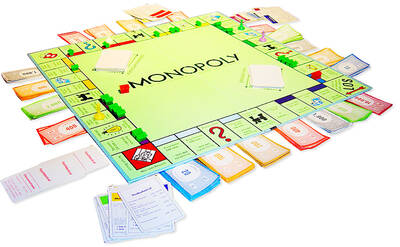
The first Monopoly set I ever owned was the one everyone had — the classic edition with Mr Monopoly on the box. I bought it as a souvenir on holiday in my 30s. Twenty-five years later, I’ve got thousands of boxes stacked away in a warehouse, four Guinness World Records and have made several TV appearances. When Guinness visited my warehouse last year, they spent a whole day counting my collection. By the end, they confirmed I had 4,379 different sets. That was the fourth time I’d broken the record. There are many variants of Monopoly, and countries and businesses are constantly